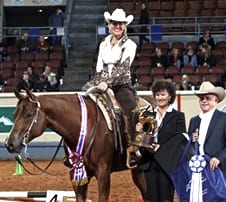Have you ever had one of those ‘woulda, coulda, shoulda’ thoughts? We
all have. Whether it is regretting putting on those extra pounds,
wishing you would have learned to play an instrument or traveled more
when you were younger–they say hindsight is 20/20. No matter where we
are on our life’s journey, we can all look back and say, ‘I wish I knew
then, what I know now.’ I was lucky enough to chat with some of the top
trainers in the industry and learn what their voices from the past were
saying.
While everyone I spoke with described an exuberance to be doing what they love as a career, one prevailing theme was the issue of fleeting time. All-Around trainer, Whitney Lagace of Higganum, Connecticut states, “In my twenties, I wish I knew how quickly time was going to go by. Building my business and raising my family was an awesome journey even through the stressful times, I wish I had taken more time to enjoy it along the way. In your twenties, you’re so eager to get to the next thing you can miss out on a lot.”
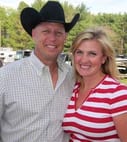 Being a horse trainer isn’t just a job, it is a lifestyle, but there is a big world out there too. Katy Jo Zuidema of Micanopy, Florida is darn sure she isn’t going to miss a minute of it. She wittily retorts, “The horse business is not the beginning and end of my existence. Nobody is curing cancer here and everyone puts their pants on the same,” Zuidema says. “My husband likes to say, ‘there is more to life than kicking a hock and pointing a toe.'”
Being a horse trainer isn’t just a job, it is a lifestyle, but there is a big world out there too. Katy Jo Zuidema of Micanopy, Florida is darn sure she isn’t going to miss a minute of it. She wittily retorts, “The horse business is not the beginning and end of my existence. Nobody is curing cancer here and everyone puts their pants on the same,” Zuidema says. “My husband likes to say, ‘there is more to life than kicking a hock and pointing a toe.'”
And for those that know Katy Jo, her zest for life is apparent. Cole Baker agrees with Zuidema and says that it is important to have “a life besides riding horses.” Often times in our twenties, we can be so enthusiastic and focused to change the world that it leads to burnout. These trainers have found a way to balance their lifestyle in horses with their lives in the outside world which has led them to maintain successful, progressive businesses.
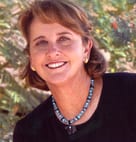 Once we reach a certain age, many of us look back and wish we had paid more attention in school; learned a second language or got a degree. Horse trainers are the same. Looking back on their twenties, professionals accentuated the need for education. AQHA World Champion trainer, Nancy Cahill, encourages young upstarts, “the best aid you have is your brain…get an education, don’t just be a horse trainer. Do it while you are working for someone, whether that means night classes or online or before you become a trainer. Don’t wait too long.”
Once we reach a certain age, many of us look back and wish we had paid more attention in school; learned a second language or got a degree. Horse trainers are the same. Looking back on their twenties, professionals accentuated the need for education. AQHA World Champion trainer, Nancy Cahill, encourages young upstarts, “the best aid you have is your brain…get an education, don’t just be a horse trainer. Do it while you are working for someone, whether that means night classes or online or before you become a trainer. Don’t wait too long.”
Cahill of Madisonville, Texas is right; once you have that framed diploma on your wall, it cannot be taken away from you, and it can give you something to fall back on. Despite the rise in technology, she says, “The one thing that computers can’t replace is a horse trainer.” However, she stresses, “Make the decision early that this is something that you want to do. If formal schooling is not your thing, there is always room for horse-related education.”
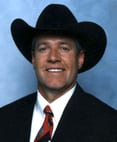 When looking back on his twenties, judge and trainer Chris Jeter of Stephenville, Texas advises, “I would say to diversify your income–don’t have all your eggs in one basket. I never regret one day I’ve spent training. I’ve always sold horses as well as judged, but I can say I wished I had learned to weld. (it would save tons to be able to repair my own facility). Also, for fun, I could have learned to make bits or spurs.”
When looking back on his twenties, judge and trainer Chris Jeter of Stephenville, Texas advises, “I would say to diversify your income–don’t have all your eggs in one basket. I never regret one day I’ve spent training. I’ve always sold horses as well as judged, but I can say I wished I had learned to weld. (it would save tons to be able to repair my own facility). Also, for fun, I could have learned to make bits or spurs.”
Jeter encourages young trainers to expand their minds by offering clinics, lesson programs, writing articles, or even writing books about training; becoming a rep for equine products– any number of things that go hand-in-hand with training.
“I love the labor part of training. It keeps us in shape, but the body can only take the beating for so long,” Jeter states. “By having various revenue streams besides training it would allow you to train fewer horses, enabling you to produce a better product due to more time spent on the ones you ride. My horses were the brokest when I was a kid–we did everything to them. With the better athletes we raise today, just imagine the possibilities.”
Whitney Lagace agrees, “It is very important to keep educating oneself. There will never be a point at which you can’t benefit from the advice and words of wisdom from other professionals.”
 And then there is money. We all wish we had started saving just a little bit earlier in life, that we hadn’t made those frivolous purchases or that we had just made better choices with our cash. While being a top trainer may seem glamorous, financially it can be tough – especially in today’s economy.
And then there is money. We all wish we had started saving just a little bit earlier in life, that we hadn’t made those frivolous purchases or that we had just made better choices with our cash. While being a top trainer may seem glamorous, financially it can be tough – especially in today’s economy.
Paul Thurston, who is located in Tarboro, North Carolina explains, “Horse training has become harder as the economy has changed. In the late 80s, if you touched a horse you could make a living. Now, it is harder to do so with rising feed, fuel and other costs.” He encourages young twenty-somethings to “live within your means.”
Thurston adds, “Save a little more money. I know when I was 20, I didn’t make a lot of money, not enough to think I had any to save, but I should have made better choices. I should have forgone the crocodile boots.”
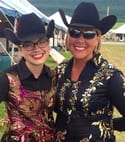 Liz Flohr of Heath, Ohio concurs, “Something both Donnie (Recchuitti) and I know now that we wished we knew in our twenties is how hard you would work and how little money you actually make as an actual horse trainer. We love our jobs, don’t get us wrong, but the overhead is very high and the bring home pay per hour is minimal. Young upstarts in this business need to work for somebody for a considerable length of time. Learn about all the aspects of the business, not just horse training. Our best advice to them would be to save their money and make good investments.”
Liz Flohr of Heath, Ohio concurs, “Something both Donnie (Recchuitti) and I know now that we wished we knew in our twenties is how hard you would work and how little money you actually make as an actual horse trainer. We love our jobs, don’t get us wrong, but the overhead is very high and the bring home pay per hour is minimal. Young upstarts in this business need to work for somebody for a considerable length of time. Learn about all the aspects of the business, not just horse training. Our best advice to them would be to save their money and make good investments.”
Nancy Cahill agrees, “Work for someone you respect. Use it as a teaching tool and stay twice as long. This way you don’t have to buy the truck, the trailer, the gas, and it is easier to make decisions.”
Cole Baker, who trains in Morriston, Florida also wishes in his 20s he had stayed working with somebody for a longer period of time. “It just makes it easier. You gain more confidence in your abilities and it makes it less of a struggle than just going out and hanging up your sign.”
Despite some young apprentices’ visions of becoming the next big thing, Chris Jeter advises, “Bigger is not necessarily better. Net income is all that counts, not gross.”
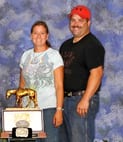 Despite ‘woulda, coulda, shoulda’ thoughts these trainers expressed, every one of them was extremely grateful to be able to live their dreams. Although Judy and Mark Zeitler of Abrams, Wisconsin (pictured left) both had other careers in their twenties before becoming trainers, they recognize their fortune to be able to pursue their goals. Judy states, “Having a real world job in my 20s, and then going into horse training, I get to appreciate the fact that I have my hobby as my job. It is kind of a journey. It is hard to keep working so hard at it, but when you get the results, it makes it all worth it.”
Despite ‘woulda, coulda, shoulda’ thoughts these trainers expressed, every one of them was extremely grateful to be able to live their dreams. Although Judy and Mark Zeitler of Abrams, Wisconsin (pictured left) both had other careers in their twenties before becoming trainers, they recognize their fortune to be able to pursue their goals. Judy states, “Having a real world job in my 20s, and then going into horse training, I get to appreciate the fact that I have my hobby as my job. It is kind of a journey. It is hard to keep working so hard at it, but when you get the results, it makes it all worth it.”
Whitney Lagace encourages, “Remember, if you can make a living doing what you love, that is a blessing.”
So perhaps we can all look back with a little nostalgia. Liz Flohr has great advice, “As far as hind sights or regrets, we try not to think of the ‘could have, would haves.’ We have made a good living and a really good life for ourselves in this business by working hard and with well thought out investments.” They say hindsight is 20/20, Chris Jeter quips, “It’s like the old joke – if I knew I would live this long, I would have taken better care of myself. No we wouldn’t. We were 10 feet tall and bulletproof back then.”
About the Author: Mo (Maureen) West grew up on a large vegetable farm in rural Ontario, Canada where she began riding and showing quarter horses as a child. Her interests mostly include all-around horses that lean toward hunter under saddle events. While continuing to compete in the quarter horse circuit across the province, Mo graduated from the University of Western Ontario and subsequently D’Youville College. She excelled at her career for 14 years as a high school English teacher and Department head. She now lives with her husband in Dublin, California.


